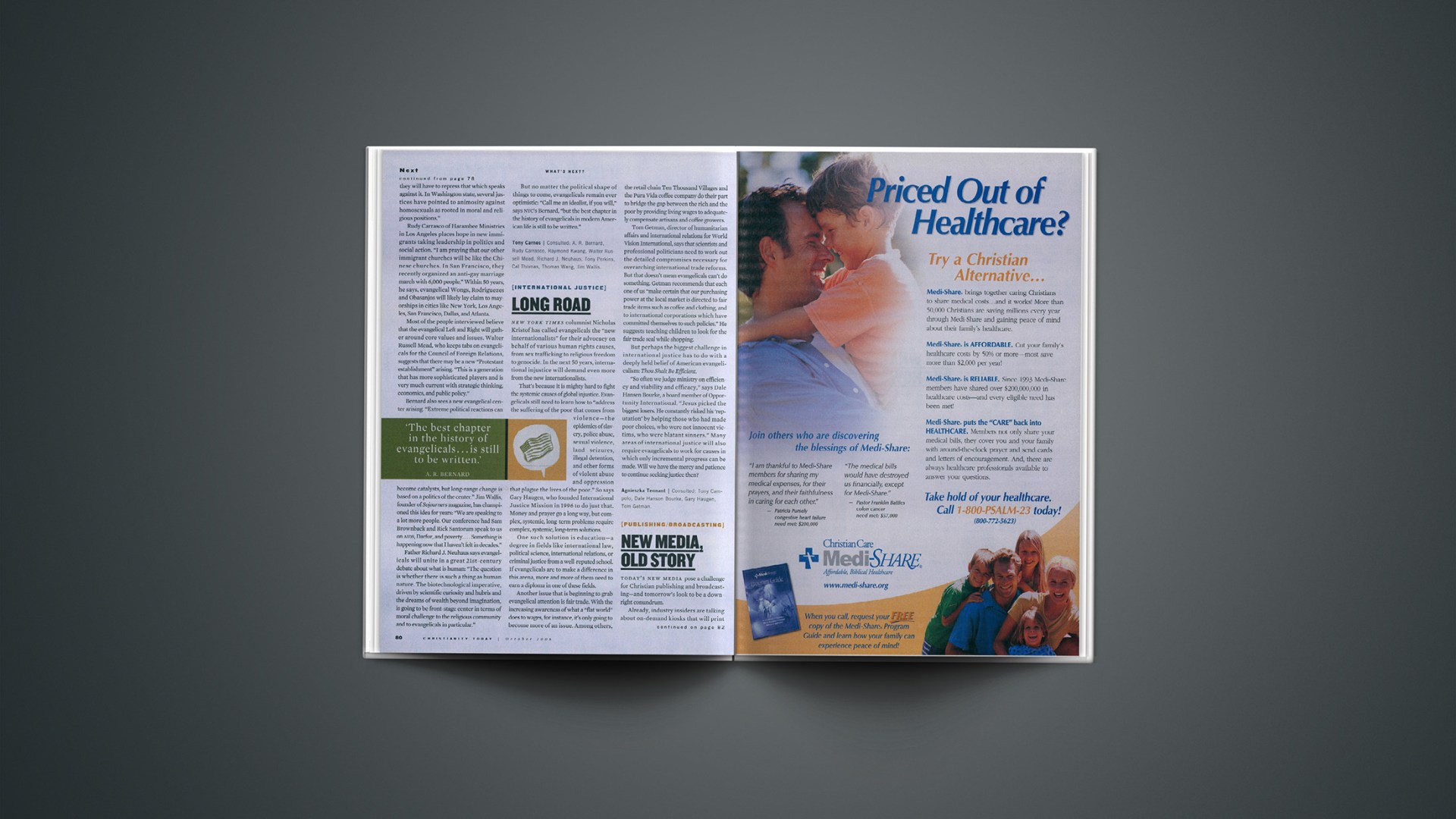We’ve asked 114 leaders from 11 ministry spheres about evangelical priorities for the next 50 years. Here’s what they said about international justice.
New York Times columnist Nicholas Kristof has called evangelicals the “new internationalists” for their advocacy on behalf of various human rights causes, from sex trafficking to religious freedom to genocide. In the next 50 years, international injustice will demand even more from the new internationalists.
That’s because it is mighty hard to fight the systemic causes of global injustice. Evangelicals still need to learn how to “address the suffering of the poor that comes from violence—the epidemics of slavery, police abuse, sexual violence, land seizures, illegal detention, and other forms of violent abuse and oppression that plague the lives of the poor.” So says Gary Haugen, who founded International Justice Mission in 1996 to do just that. Money and prayer go a long way, but complex, systemic, long-term problems require complex, systemic, long-term solutions.
One such solution is education—a degree in fields like international law, political science, international relations, or criminal justice from a well-reputed school. If evangelicals are to make a difference in this arena, more and more of them need to earn a diploma in one of these fields.
Another issue that is beginning to grab evangelical attention is fair trade. With the increasing awareness of what a “flat world” does to wages, for instance, it’s only going to become more of an issue. Among others, the retail chain Ten Thousand Villages and the Pura Vida coffee company do their part to bridge the gap between the rich and the poor by providing living wages to adequately compensate artisans and coffee growers.
Tom Getman, director of humanitarian affairs and international relations for World Vision International, says that scientists and professional politicians need to work out the detailed compromises necessary for overarching international trade reforms. But that doesn’t mean evangelicals can’t do something. Getman recommends that each one of us “make certain that our purchasing power at the local market is directed to fair trade items such as coffee and clothing, and to international corporations which have committed themselves to such policies.” He suggests teaching children to look for the fair trade seal while shopping.
But perhaps the biggest challenge in international justice has to do with a deeply held belief of American evangelicalism: Thou Shalt Be Efficient.
“So often we judge ministry on efficiency and viability and efficacy,” says Dale Hansen Bourke, a board member of Opportunity International. “Jesus picked the biggest losers. He constantly risked his ‘reputation’ by helping those who had made poor choices, who were not innocent victims, who were blatant sinners.” Many areas of international justice will also require evangelicals to work for causes in which only incremental progress can be made. Will we have the mercy and patience to continue seeking justice then?
Agnieszka Tennant | Consulted: Tony Campolo, Dale Hanson Bourke, Gary Haugen, Tom Getman.
Copyright © 2006 Christianity Today. Click for reprint information.
Related Elsewhere:
More Christianity Today coverage of international justice issues is available in our Social Justice and Politics & Law full coverage area.
We continue our look at what evangelical leaders think are the priorities for the next 50 years in 11 categories: local church, youth, missions, politics, publishing/broadcasting, theology, culture, evangelism, higher education and relief and development.
Christianity Today‘s other articles on its 50th anniversary include:
Where We Are and How We Got Here | 50 years ago, evangelicals were a sideshow of American culture. Since then, it’s been a long, strange trip. Here’s a look at the influences that shaped the movement. By Mark A. Noll (Sept. 29, 2006)
Sidebar: ‘Truth from the Evangelical Viewpoint’ | What Christianity Today meant to the movement 50 years ago. (Sept. 29, 2006)
Evangelism Plus | John Stott reflects on where we’ve been and where we’re going.
Sidebar: Legacy of a Global Leader | Less known than Stott’s earlier work is his ministry with Langham Partnership International.
One Reader’s Thoughts on Christianity Today‘s 50th Anniversary | After five decades of reading, I’ve clipped far too many articles. (Oct. 12, 2006)










